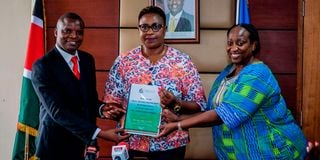Two-thirds gender rule: Kenya's legislative crossroads

From left: Association of social workers representative George Kombe, former Cabinet Secretary for Gender, Culture, the Arts and Heritage Aisha Jumwa and co-chair of the multi-sectoral working group Daisy Amdany during a handover of the report from the multi-sectoral working group on the realisation of the two-thirds gender rule on February 23, 2024 in Nairobi.
What you need to know:
- Kenya's efforts to achieve the two-thirds gender principle in Parliament have reached a critical juncture, with a joint committee set to consider proposed legislative amendments.
- The amendments, recommended by a taskforce and incorporated into the Nadco report, aim to ensure equitable representation of women in both the National Assembly and Senate.
Whether or not Kenya will have a law ensuring equitable representation of women in Parliament now lies in the hands of the joint committee of the National Assembly's Justice and Legal Affairs Committee (JLAC) and the Senate's Justice, Legal Affairs, and Human Rights Committee.
Upon MPs' return from a short recess next week, the joint committee will consider the feasibility of the bills proposed by the taskforce on the realisation of the two-thirds gender principle, established by former Gender Cabinet Secretary Aisha Jumwa.
Addressing the gender impasse was a key issue on the agenda of the), which recommended considering the taskforce's framework.
By November 2023, the Nadco committee had prepared its report, which Parliament adopted on February 22, 2024, a day before the gender taskforce handed over its report to the then-CS Jumwa.
Special seats
The three legislative amendments proposed by the taskforce were already included in the Nadco report: the Constitution of Kenya (Amendment) Bill, the Elections (Amendment) Bill, and the Political Parties (Amendment) Bill. These proposed laws aim to implement the two-thirds gender quota as outlined by the taskforce.
The Constitution of Kenya (Amendment) Bill would amend Article 97(1) to add a provision on the nomination of special seats to ensure conformity with the two-thirds gender principle. A similar addition is proposed for Article 98(1) regarding the Senate.
The Elections (Amendment) Bill requires political parties to submit gender-compliant candidate lists for parliamentary and county elections to the Independent Electoral and Boundaries Commission. The Political Parties (Amendment) Bill proposes creating a Women Inclusion and Political Participation Fund, administered separately from the Political Parties Fund, to support education, training, mentorship, and capacity building for women seeking elective positions.
On March 5, 2024, the Speaker of the National Assembly, Moses Wetang'ula, directed the committees to hold joint sittings to consider the constitutional amendments and submit a report within 45 days. Although the deadline has passed, George Murugara, chair of the JLAC, indicated that the bills would be considered in the "next session."
“We have received the taskforce report and will consider the feasibility of the proposals and agree on the publication. If we fail to agree, then it ends there,” he said. Murugara acknowledged the challenges in implementing the two-thirds gender law.
Once a committee reviews a proposal, they recommend to the Speaker whether it should be published as a Bill. The Speaker then authorises the Government Printer to publish the Bill in the Kenya Gazette, after which it is introduced in the House for the first reading.





